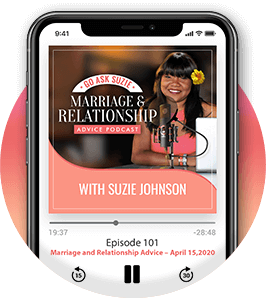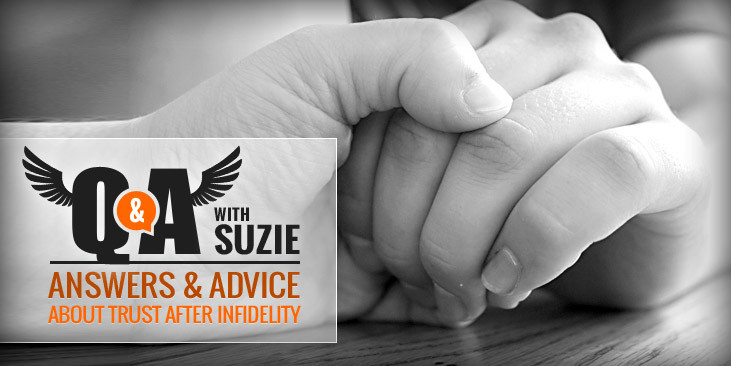In this article you will find
![]() Dear Suzie, Both my wife and I have been trying to rebuild the trust again after the affair, but it doesn’t seem to stick. I’ve heard that once trust is broken, the relationship will never be the same again. I sincerely hope this isn’t true because before this happened, we totally trusted each other. And now, it seems like she’s plagued with doubts and insecurities about me all the time. What can I do to repair the trust so we can both be happy again?
Dear Suzie, Both my wife and I have been trying to rebuild the trust again after the affair, but it doesn’t seem to stick. I’ve heard that once trust is broken, the relationship will never be the same again. I sincerely hope this isn’t true because before this happened, we totally trusted each other. And now, it seems like she’s plagued with doubts and insecurities about me all the time. What can I do to repair the trust so we can both be happy again?
![]() Let me begin with one of my favorite stories. It’s the story of how the “demon of doubt” was unleashed into the world. According to Greek lore, it happened like this:
Let me begin with one of my favorite stories. It’s the story of how the “demon of doubt” was unleashed into the world. According to Greek lore, it happened like this:
Once upon a time, when the world was young, a goddess came across a box buried deep in a cave on a remote island on the other side of the earth. Curious about what was in the box, she pried it open and unwittingly unleashed the demon of doubt from the prison where the god Zeus had banished him a millennium ago.
Delighted at being set free, the demon cackled with glee.
“Now,” the demon cried, “I will go and find a new host, a new place where I can create mischief, chaos, and confusion!”
At first he attempted to take up the goddess who had set him free, but she was a goddess and therefore immune to his wiles. So he flew from the cave in a rage, looking for another place to live. After a while, he came upon the village of man. Innocent and open-hearted, the children of men opened their hearts and homes to the demon, and he immediately went to work creating the mischief he so enjoyed.
To the carpenter, he whispered, “What does it matter? Your skilled labor brings no riches.”
To the artist he said, “What’s special about you? Nobody likes what you do anyway.”
To the baker he said, “Your bread is not the best. The baker from the next village bakes a better loaf than this.”
In the ear of the new bride he whispered, “Your form and face are not enough. It’s only a matter of time before your true love strays.”
And when the children went to play in the meadows, his voice changed into the rain and the wind as he sang a song: “Unwanted and unloved, all little children are unwanted and unloved.” And because they believed the demon of doubt, their hearts and minds were filled with fear and mistrust
Then one day, the demon of doubt came across a little girl playing with her dolls.
“You’ll never be as pretty as these dolls,” he whispered. At first, the little girl became sad upon hearing these horrible thoughts, but she was a smart little girl and eventually she brightened up.
“That’s not my real voice,” she said to herself.
“That’s just a pretend voice like the ones I make up for my dolls.” On hearing this, the demon of doubt got very mad. “No, no!” it shrieked. “I am not a pretend voice! I am your voice! I am real. I am real. I am you, and the words I speak are true.”
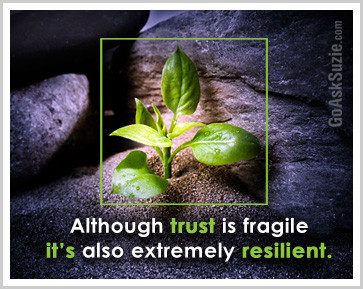
The little girl thought about what the voice said for a while. But she was not fooled. “No! You are not me! Because I am the one listening and you are the one talking.” And in that instant, the demon of doubt fled.
I have always liked that story because it illustrates two key insights:
- The voice of doubt is a type of auditory hallucination.
- If you’re the listener, you can’t also be the speaker.
Why are these insights important?
They’re important because when it comes to rebuilding trust after infidelity, learning not to listen to the voice of doubt will be your biggest challenge.
Seems easier said than done, right?
But don’t despair. Before you’re finished reading this article, I’m going to give you some tools for effectively silencing that voice of doubt. I’m going to share with you my recipe for restoring trust that will point the way from mistrust to trust… from suspicion to peace of mind… from anxiety to self-confidence… and from living in a fear-ridden relationship to enjoying a harmonious relationship. Let’s begin that journey now.
Why It's So Important to Trust Again After the Affair
All relationships are based on commitment, and all commitments are based on trust. So when you don’t have trust, then you don’t have a commitment. If you don’t have a commitment, then you don’t have a relationship. This tells you that a loving relationship without trust is impossible. That’s why the real foundation of all relationships comes down to one word: Trust.
Your Greatest Asset
Trust is like the pulse of your relationship. And like a pulse, you don’t notice it as long as it’s functioning properly. But when trust isn’t functioning, everything else falls apart.
You’re here because… infidelity created a reversal of trust in your relationship. And once the laws of trust have been reversed, everything is the exact opposite of the way it was before.
For example:
- Darkness obscures the light the way black ink obscures the clarity of the water it’s poured into.
- Anger wipes out laughter and joy like a tsunami wipes out a beachfront resort.
- Feelings of safety and certainty are replaced by darker emotions of suspicion and doubt.
- Peace of mind is replaced by obsessive thinking.
- Confusion blots out certainty like a dark cloud blocks out the sun.
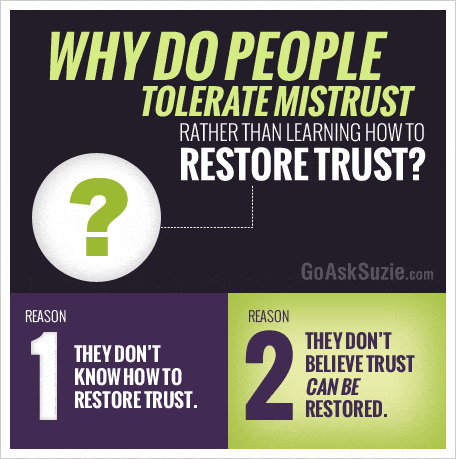
At a time like this…
Your greatest challenge is finding a way to reverse the mistrust and restore the trust in your relationship. If this sounds like something you’d like to experience, then you’ve come to the right place.
However, before we go forward, here’s a key distinction you need to make: there’s a huge difference between “restoring trust” and learning how to “live with mistrust”.
Unfortunately, many people get confused about these two ideas. So rather than seeking to learn how to restore trust, they spend the majority of their time trying to figure out how to “tolerate” the mistrust.
Maybe it’s crossed your mind…
Why would anyone choose to tolerate mistrust rather than learn how to restore trust? Well, two key reasons come to mind:
Reason #1: They don’t know how to restore trust.
Reason #2: They don’t believe trust can be restored.
But that doesn’t have to be your story. Rather than simply learning to live with the pain of mistrust, I’m going to show you how you can restore that sense of trust back into your heart, mind, and relationship. And I’ll start by answering the most important question.
Key Question: Once trust is lost, can it really be rebuilt?
Yes, it can. Contrary to popular belief, although trust is fragile, it’s also extremely resilient.
Coming up next is my recipe for rebuilding trust for any couple.
Are you ready to learn?
How To Trust Again After The Affair
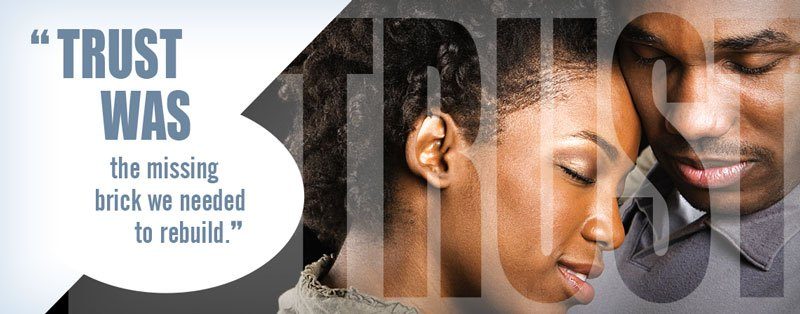
The Recipe for Rebuilding Trust After the Affair
In the recipe for rebuilding trust after infidelity, here’s what you’re going to need:
- Two key skills: patience and practice
- Two types of tasks: right actions and shared trust-building activities
- Three key ingredients: honesty, authenticity, and transparency
Let’s go over each one individually, starting with the two key skills you’ll need.
The Two Key Skills for Rebuilding Trust
Why is patience important?
Patience is important because Rome wasn’t built in a day, and rebuilding trust in your marriage won’t be either. In the upcoming days and weeks, there are going to be times when your patience is called into question. When this happens, instead of limiting your patience, I want you to increase it.
For example:
- When despair threatens, reach for patience.
- When setbacks happen, reach for patience.
- When misunderstandings happen, reach for patience.
Remember: Mother Nature’s secret is patience. In time, all good things flow. Therefore, your patience in the process of rebuilding is one of your most important skills. Use it.
Why you need practice:
Trust is based on result — not intentions. The same is true for a professional baseball player. They gain mastery in their practice (not their potential). Therefore, if you want to rebuild trust, you must practice being trustworthy. In other words, the more you practice, the more trust points you build up over time. And like money in the bank, the more trust points you have, the more freedom you gain.
Now, let’s talk about the two types of tasks you need to do (right actions and shared trust-building activities).
Why right actions are important:
Remember, trust is built on actions — not words. But not just any type of actions… it requires “right actions”. What are right actions? It’s any action that gets you the right results (both in the short-term and the long-term). And when you think about it, it only makes sense, because how do you lose trust? You guessed it. You lose trust by taking wrong actions. So it only makes sense that taking right actions will restore trust.
The next question that comes to mind is this: how do you know what “right” actions you need to take in order to restore trust? Good question. Here’s my rule of thumb: right action is any action that moves both you and her towards a feeling of safety and security. Wrong action would be any action that moves her away from feeling safe and secure.
Why trust-building activities are important:
Trust is both experience and intuition. This is why corporate America spends billions of dollars annually on team building activities, training, and exercises. It’s all in an effort to help coworkers have the “experience” of trusting each other. The same applies in relationships, and this is why engaging in shared trust-building activities is so important. They help couples to have the actual experience of trusting each other.
Now, let’s talk about the three key ingredients you’re going to need (honesty, authenticity, and transparency).
3 Keys for Rebuilding Trust After the Affair
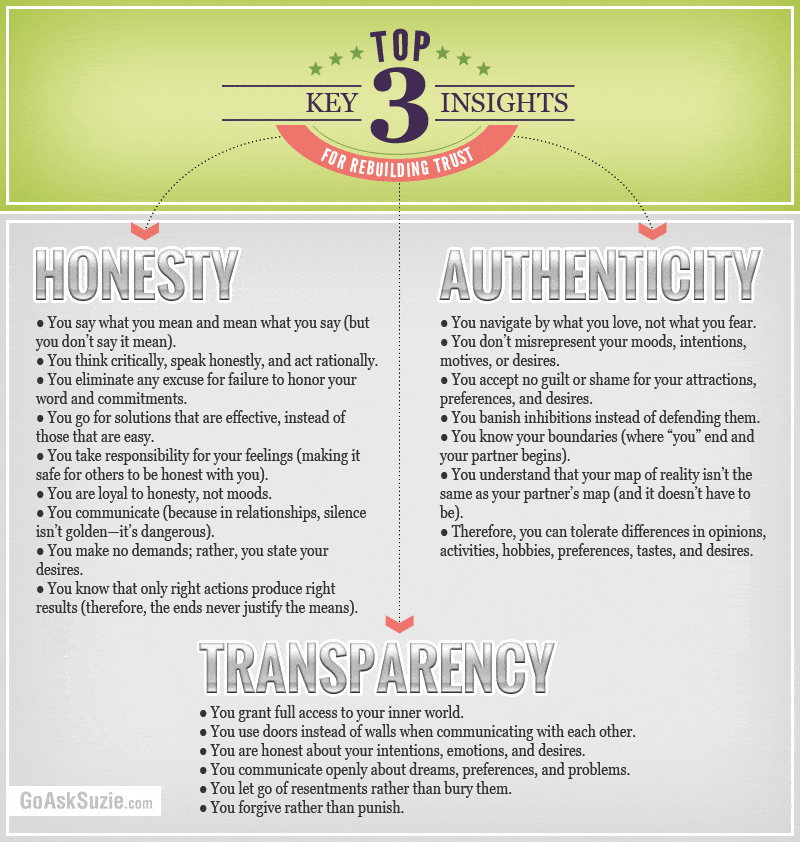
Honesty
If rebuilding trust is the goal, then honesty is the tool. The word honesty means: consistent loyalty to truth. And living honestly in a relationship means: You hold a consistent set of beliefs and act in accordance with those beliefs.
This also means:
- You say what you mean and mean what you say (but you don’t say it mean).
- You think critically, speak honestly, and act rationally.
- You eliminate any excuse for failure to honor your word and commitments.
- You go for solutions that are effective, instead of those that are easy.
- You take responsibility for your feelings (making it safe for others to be honest with you).
- You are loyal to honesty, not moods.
- You communicate (because in relationships, silence isn’t golden — it’s dangerous).
- You make no demands; rather, you state your desires.
- You know that only right actions produce right results (therefore, the end never justifies the means).
Transparency
Trust is rebuilt when expectations match reality. Living transparently means you live in such a way that your life is an open book, and your actions and activities are easily verified by your partner. This allows them to know that your actions, words and promises match… exactly as they should. Keep in mind: The more willing you are to be transparent, the more trust points you will earn. The opposite is also true. The more secretive and defensive you are, the more trust points you will lose.
Therefore, living transparently means:

- You grant full access to your inner world.
- You use doors instead of walls when communicating with each other.
- You are honest about your intentions, emotions, and desires.
- You communicate openly about dreams, preferences, and problems.
- You let go of resentments rather than bury them.
- You forgive rather than punish.
(For more insights on how to become a more transparent couple, read my article The Transparent Couple.)
Authenticity
Being authentic means being loyal to the truth of who you are. Living authentically in a relationship requires you to drop the masks, the pretenses, and the attempts to gain approval — all of which allow your partner to truly know you (inside and out). This is the real meaning of intimacy (in-to-me-see). Therefore, there’s no intimacy without authenticity.
When you live authentically in relationships:
- You navigate by what you love, not what you fear.
- You don’t misrepresent your moods, intentions, motives, or desires.
- You accept no guilt or shame for your attractions, preferences, and desires.
- You banish inhibitions instead of defending them.
- You know your boundaries (where “you” end and your partner begins).
- You understand that your map of reality isn’t the same as your partner’s map (and it doesn’t have to be).
- Therefore, you can tolerate differences in opinions, activities, hobbies, preferences, tastes, and desires.
Putting it all together…
The reality is that shaky foundations make shaky buildings, and rock-solid foundations support rock-solid relationships.
What are rock solid relationships built on?
One word: TRUST.
And what is trust built on? Experience, of course!
When expectations match reality, when actions and activities are transparent, and when people feel free to be themselves, you experience trust.
Sounds like a lot of work?
Don’t be afraid because the rewards are well worth the effort.
Until we speak again…
Remember… Love Wins!






